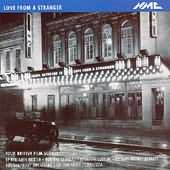British composers of “serious” music have been much more likely to do film music than their American counterparts, few of whom ever have contact with Hollywood. Here, the NMC label unearths four scores spanning 40 years of British music and cinema, all by established classical composers. While none represents a neglected masterpiece, they are high in quality and diverse in style. This well-done disc will appeal to listeners with a strong interest in British cinema or in Britain’s 20th-century classical music scene.
Love from a Stranger (1937, dir. Rowland V. Lee) was Britten’s only commercial film score. (He vowed to do no more after Lee cut large portions of his music.) Starring Basil Rathbone, this thriller juxtaposes lonely, ominous music with an affectionate satire on waltz music that presages the “Bridge Variations”. Instantly recognizable as a work by Britten, albeit lacking structure, it should be of interest to fans of the composer. Others will find it well-crafted and charming but not especially important music.
Going forward 25 years, we find Roberto Gerhard producing his second and last film score during the period of his full maturity. This Sporting Life (1962) is the most important film represented here, being director Lindsay Anderson’s first feature. It starred Richard Harris as a coal miner who becomes a rugby star. Gerhard was the pioneer teacher of Schoenberg’s style in Britain, and this psychological study is backed by a post-romantic serial score. The music is powerful, and despite its atonality is strongly communicative though “difficult” music.
Elisabeth Lutyens is the program’s least-known composer. Even though she wrote more than 90 film scores she is remembered primarily as a concert composer. The Skull (1965, dir. Freddie Francis), one of many Hammer Films she scored, starred Peter Cushing and had Christopher Lee as “guest star”. Based on The Skull of the Marquis de Sade by Psycho author Robert Bloch, it evoked a score that remains a very high-quality representative of the horror film genre. The only drawback to this 18-minute suite is that it is emotionally limited to the eerie mood that dominates the film.
The one composer on this disc best known for his film music (though he has had an honored concert career as well) is Richard Rodney Bennett, whose 1982 film The Return of the Soldier (dir. Alan Bridges) illustrated the attempts of a shell-shocked World War I veteran (Alan Bates) to unlock the secrets concealed by partial amnesia. Bennett, who wrote the music for Murder on the Orient Express and Four Weddings and a Funeral among many others, uses his undeniable skill as a romantic melodist as Bates’ character learns why he married a wife he cannot remember rather than a first love he could not forget. The very touching music provides a welcome return to tonality after the Lutyens and Gerhard scores.
Jac Van Steen conducts the BBC Symphony Orchestra in this intriguing program. The music is well played, but rather cool, leaving us with a desire for more overt emotional expressiveness. In sum, this release does much to satisfy the curiosity–especially for film aficionados–but offers less to satisfy the heart. Nice sound.
































